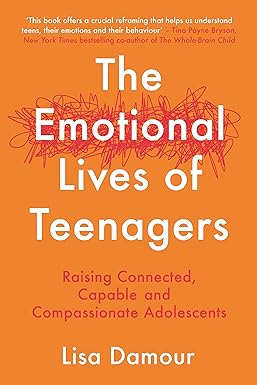
Oh the drama!
Having a tween or teen means there. will. be. drama. And lots of it! But how to help your child with teen drama—that’s where parents can really struggle.
Our kids face overwhelming pressure in almost every aspect of their lives and we all know that it can lead to meltdowns of epic proportions.
From ridiculously hard classes to a full calendar of extra-curricular and social activities and then sometimes there are even jobs thrown in there, their schedules are logistical nightmares.
Hormonal shifts create unpredictable mood swings, and it might seem like your teen is on a daily emotional roller coaster. Insecurities run rampant about everything from how they look and act to whether or not they fit-in, while at the same time worrying about whether or not they stand out.
And let’s not forget the complicated social issues that flood their lives with faltering friendships, the emotional challenges of romantic relationships, and the relentless efforts they put into keeping up with the ever-changing plans with their peers.
Related: My Teen Daughter Was Betrayed by Her Best Friend And It Hurt Us Both
Put this all together with some good old fashioned peer pressure, and welcome to the world of teenagers—spelled D-R-A-M-A.
Every day brings new challenges for our kids who are trying to figure out how to do it all, be it all, and keep it all going through their teenage years. They are juggling so many balls and almost daily at least one falls, breaks, or explodes, leaving their entire world in pieces on the floor. And when one piece of their life is a mess, it can get magnified, causing everything else to come to a screeching halt.
We as parents can feel overwhelmed with their struggles too. Our kids experience so much stress, it becomes stressful for us. We want so badly to help them when things get hard— to somehow make things less painful, less overwhelming, less dramatic. We want this for them, but being honest, also for us. Sometimes it’s just all too much.
3 Ways Parents Can Help Their Kids Navigate Teen Drama
The constant turmoil of teen drama can be exhausting—we get it. But the truth is, our kids need us to be there, listen, and offer support. If we can do that for them, especially during these tumultuous teen years, we will build a trusting bond that will keep them coming back to us over and over again. And we all want that, right?
1. Actively listen to them.
Consider yourself lucky if your teen will share details about their personal lives with you—especially during adolescence. That’s fantastic!
When your teen spills all their feelings and shares anything difficult they are going through, simply listen with patience and empathy. Tell them how sorry you are that they are going through this difficult thing. Validate their feelings with affirming words that are comforting, not condemning.
Don’t interject your opinions or suggestions.
Don’t multi-task while they’re talking.
Give them your undivided attention and be present with them and tune in to what they are saying. This is the most important way you can nourish your relationship with your teen and be there for them when things get hard.
You may have strong feelings about what they are sharing. You might be surprised, offended, angry, or hurt. You may even find all the teen drama ridiculous. But this isn’t about you, it’s about your kid and what they are experiencing.
2. Sit in the mess with them.
When their world is spinning out of control, you need to be their anchor. You are the adult and they need your stability to feel secure in their mess. They don’t need you to add to their teenage drama, they need you to diffuse it by being strong enough to hear what they’re saying and remain calm. They need you to nod or shake your head with full investment in each detail. They need to feel like you get it and you get them, whether you do or not. This is about being IN IT with them, stretching out of your world to reach into theirs.
If you interrupt them with your thoughts and feelings about their situation, you are creating a barrier between their outpouring and your ear. Sometimes teen girls and boys just want to vent, express how they are feeling, and talk about what’s going on that is upsetting them. Give them a chance to share everything and allow them to process it all out loud. Be their sounding board, their confidant, someone they can trust to not judge or criticize how they are handling things.
Also, try not to sound shocked or appalled at anything they tell you. When they are already feeling vulnerable, your teen doesn’t also want to feel judged, so try to keep reminding them (and yourself) that no topic should be taboo and they should feel comfortable talking to you about anything.
And, if your teen doesn’t seem to tell you anything, we get that too. Getting your teen to open up can be a challenge. Just keep staying available and listen more than you talk. If you don’t hound them, they will eventually open up.
3. Offer your help, but let them hold the reins.
This doesn’t mean you are going to give your opinion about exactly what your child should do in these circumstances. It also doesn’t mean you will tell them what you will do about the situation.
This is their drama to handle unless someone’s life is in danger. Remember, one of your goals as a parent is to teach your teen problem-solving skills so they can eventually manage life on their own. They need to develop coping mechanisms so they can handle heartache, adversity, conflict, and mistakes in healthy ways. These are the opportunities for them to do just that.
So how do help to our teens deal with the drama while not solving everything for them?
We ask this one simple question: “How can I help you through this?”
It’s hard to hold your tongue and not offer specific suggestions, but this open-ended question puts the choice in your teen’s hands about how they want you to be involved. They may have some ideas for what they need from you or they may just need you to listen because there’s really nothing to do to change the situation.
If your kid asks you what you think or what they should do, then yes you have been granted permission to dive in. However, you still need to carefully choose your words when giving them advice. Remember what seems like silly teen drama to you probably feels life-altering to them.
“Brainstorm solutions together and talk about the different choices available to resolve the situation,” suggests Foundations Counseling, LLC. “This empowers your teen to take control of their decisions, and their self-confidence will grow as a result. These skills may even help your child avoid drama in the future.”
Related: 10 Common Problems Middle School Girls Face (And How Parents Can Help)
Helping your teen survive the drama means playing the long game
Remind yourself of the TWO GOALS you want to accomplish:
- Keeping a trusted relationship with your teen.
- Helping them figure out how to get through the drama.
The most important being #1. Please don’t tear them down by telling them they did something stupid or unacceptable. If they did, they most likely already know it and feel terrible. Telling them all of this again is only going to add to the drama.
Sure, you can address their behavior and possible consequences, but be mindful that you want them to still talk to you when things get bad in the future. Remember these are the years when your kids will make mistakes, and some of them might be really big ones. Ask yourself if you want to keep the relationship healthy and strong with your teen. If the answer is yes, then be thoughtful about how you react and the words you choose.
Even as adults, what we want most is someone who will come beside us and walk through the mess with us without critical judgment, right? Our kids need that too.
They may not show it all the time, but our opinion of them matters. What we say matters. When they are in a vulnerable situation and their feelings are exposed, we can either dive in and keep them from drowning or we can be just one more hand pushing them under the water.
We need to ask ourselves what would we want in our moments of despair? Of course, our kids want that too.
Teen drama is an inevitable part of middle school and high school life. But by truly listening to them and offering help on their terms (without a side of judgment) we hold the key to dialing it all down. And the best part is that we’re not only helping them, but we’re helping ourselves. Teenagers create chaos, but we can restore calm to their hearts and our homes. Making all our lives a little more peaceful, at least until the next meltdown.
For more tips and resources on navigating the emotional teenage years, we recommend The Emotional Lives of Teenagers by Lisa Damour.

Parenting teens is hard, so let us make it a little easier with these other helpful posts:
How to Deal with Teenage Backtalk and Disrespect
This Is Why Teen Girls Are So Mean to Their Mothers
These Are the Mistakes I Made That Caused My Daughter to Quit Sports
How to Help Your Daughter Deal With a Mean Girl Friendship
*This post may contain affiliate links where we earn a small commission for purchases made from our site.







5m102o
31ffmf